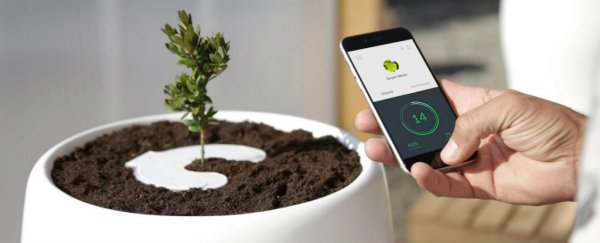Meet the Bios Urn - a biodegradable urn that uses soil and cremation ashes to grow a tree from the remains of your loved one.
Supported by a sensor and an app that track moisture, ground temperature, levels of light exposure, electrical conductivity, and humidity, and a device that automatically takes care of the watering, it's a pretty cool way to memorialise someone in death.
No one likes to think about the death of a loved one, whether it's friends, family, or even a dutiful pet, but the fact is we don't 'disappear' when we die - our remains continue to have an impact on the environment, and as the planet gets more and more crowded, it's time we reconsidered our options.
We all know the problems with burial - we're fast running out of physical space to bury entire bodies, and once they're underground, all the chemicals used for the embalming process, including formaldehyde, phenol, methanol, and glycerin, seep out into the soil.
There's the incredible amount of resources that go into the actual casket too. According to the Berkeley Planning Journal, conventional burials in the US every year use 30 million feet (9 million metres) of hardwoods, 2,449 tonnes of copper and bronze, 94,593 tonnes of steel, and 1,484,154 tonnes of reinforced concrete.
Plus it takes a whole lot of water and fertilisers to keep plots looking so green, and they're fast becoming a land sap. Tech Insider reports that if you added up the entire square footage of all the cemeteries in the US, it would measure 1 million acres of land.
Many people consider cremation the more environmentally friendly option, because it doesn't take up land space, leak chemicals into the soil, or use up valuable resources, but it's certainly not perfect.
First off, there's the energy cost of burning bodies to ash. According to Leo Hickman at The Guardian, "[A] cremator uses about 285 kiloWatt hours of gas and 15kWh of electricity on average per cremation - roughly the same domestic energy demands as a single person for an entire month."
And on top of the greenhouse gases that are produced by burning the body - including carbon monoxide, fine soot, sulphur dioxide, and heavy metals - Hickman reports that cremation is responsible for 16 percent of the UK's mercury pollution (thanks to our dental fillings).
The problem is, besides burial and cremation, we don't have a whole lot of options available to us in death.
Two Italian designers are working on 'eco pods' that act as natural caskets and sprout a tree from your remains, but are illegal according to current laws in Italy relating to what's known as natural burials. "Italian law states that coffins can only be made out of wood and tin, and must be buried in a protected, controlled, and closed area," Jessica Orwig reports for Business Insider.
In the US and the UK, natural burials are only allowed in a few, carefully selected properties, and this is unlikely to change any time soon.
Another option is the so-called Mushroom Death Suit, but this also relies on a natural burial, and is currently undergoing trials.
So in the absence of more feasible, environmentally friendly, and legal options, we have to make the most of what we've got, and that's where the Bios Urn comes into it. While it relies on the process of cremation, which isn't great, it does give you and your loved one the opportunity to give something back - a tree.
Within the biodegradable urn, the ashes are placed alongside growth medium, soil, and the seed of your chosen tree. While the actual ashes are in fact sterile, by mixing it with other materials that are high in nutrients, you can still grow something from them.
The urn includes a built-in irrigation system and a reservoir that can hold about 20 days' worth of water, so you don't have to worry about a daily watering schedule.
As Gizmag explains, a sensor is also placed in the soil to track the moisture, ground temperature, levels of light exposure, electrical conductivity, and humidity, and it transmits this to an app so you can keep an eye on everything too.
Basically, the last thing you want to do is relive the death of a loved one by killing off their memorial tree, so the Bios Urn is designed to avoid that as best it can.
The inventors are currently raising funds for the urn via Kickstarter, and expect to start shipping them in November.

